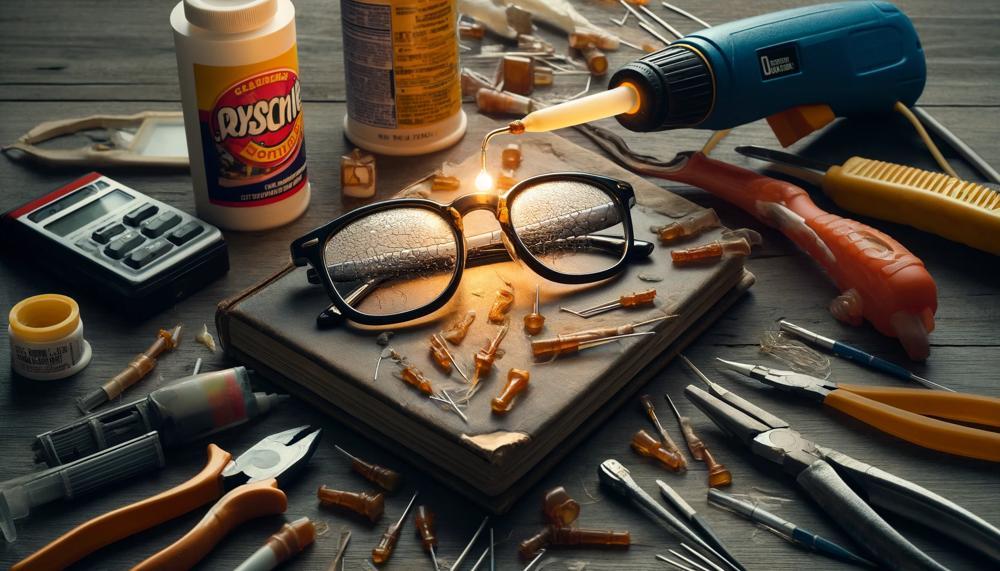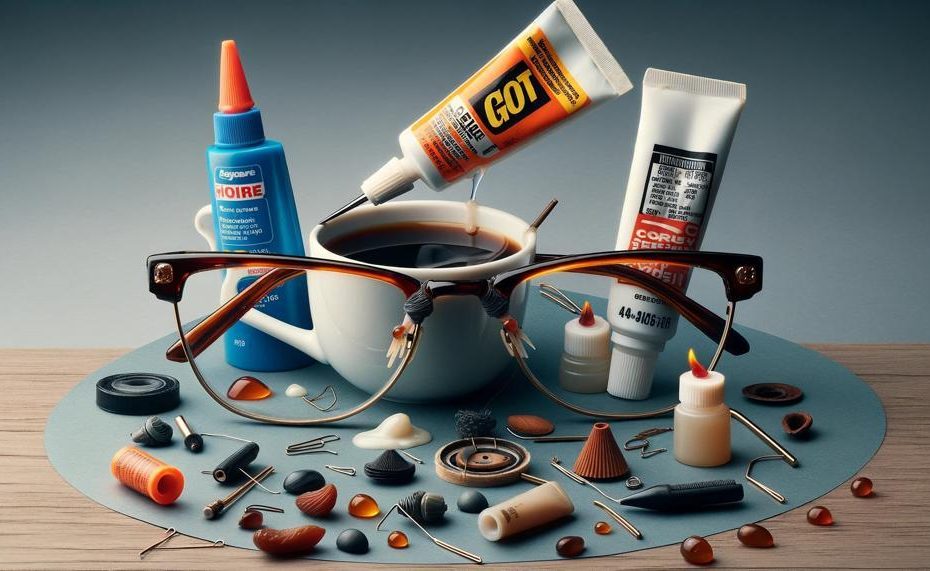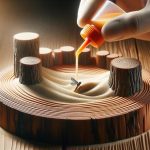Did you know that over 6 million pairs of glasses are broken each year in the U.S. alone? Among the myriad of DIY fixes available, using hot glue to mend glasses frames may sound like a quick and easy solution.
This article explores the potential of hot glue as a temporary remedy for your eyewear woes.
So, can i use hot glue to fix glasses?
Yes, you can use hot glue to fix glasses, but it’s important to consider both the advantages and disadvantages of this method12.
Advantages:
- Hot glue is cheap and easy to find.
- It can provide a temporary fix.
- Hot glue offers affordability, ease of application, versatility, and a temporary fix.
- It is a cost-effective adhesive that won’t break the bank.
- Its quick melting nature and simple application process allow for a speedy repair job.
Disadvantages:
- One big concern is the potential damage hot glue can do to your lenses. Smudges, residual glue, or even distortions could mess with your vision clarity and precision.
- Hot glue might hold up for a while, but everyday wear and tear plus moisture exposure could weaken its grip over time.
- The primary drawback is its lack of durability compared to specialized eyeglass adhesives.
Whether you’re looking for a temporary fix or just curious about this unconventional method, join us as we weigh the pros and cons of using hot glue for glasses repair.
Dive deeper to find out if this could be a viable option for your spectacles, or if it’s better to stick with more traditional repair methods.
Table of Contents
- 1 Pros and Cons of Using Hot Glue on Glasses
- 2 Potential Risks of Using Hot Glue on Glasses
- 3 Considerations for Aesthetics When Using Hot Glue on Glasses
- 4 Potential Impact on Warranty When Using Hot Glue on Glasses
- 5 Alternatives to Hot Glue for Fixing Glasses
- 6 Tips for Safely Applying Hot Glue to Glasses
- 7 Professional Eyeglass Repair Services
- 8 Conclusion
Pros and Cons of Using Hot Glue on Glasses
| Pros | Cons |
|
|
Benefits of using hot glue include its ability to form a durable bond quickly and cheaply, suitable for various materials. This makes it an appealing option for quick fixes. Drawbacks, however, are significant. The high temperature of the glue poses a risk of damaging sensitive components like plastic lenses.
Over time, the bond may weaken, particularly if the glasses are exposed to moisture or heat, necessitating further repairs. This makes hot glue a less reliable choice for a long-term solution.
Additionally, its application can be messy, which might compromise the aesthetic look of the glasses.
Potential Risks of Using Hot Glue on Glasses
Using hot glue to mend glasses presents several potential risks that may compromise both the functionality and the longevity of your eyewear. Here’s a deep dive into the problems and practical solutions:
| Risk | Description | Preventive Measure |
|---|---|---|
| Lens Damage | High temperatures can cause distortion or cloudiness in lenses. | Ensure glue does not contact the lenses during application. |
| Poor Adhesion | Glue may not bind effectively to the materials of some frames. | Test on a small, inconspicuous area first to check compatibility. |
| Thermal Expansion | Hot glue expands or contracts, loosening over time. | Use minimal amounts and allow to set fully before use. |
| Lack of Flexibility | Once hardened, hot glue can crack under pressure. | Opt for more flexible adhesives designed for eyewear repair. |
| Messy Application | Excess glue can leave residues, marring the appearance. | Apply carefully with precision, using tools like toothpicks for small amounts. |
| Weak Bond | The bond may degrade quickly, leading to frequent repairs. | Consider more durable alternatives or professional repair services. |
| Warranty Voidance | DIY repairs with hot glue can void manufacturer warranties. | Check warranty conditions before attempting home repairs. |
| Burn Risk | Improper handling can lead to accidental burns. | Work in a safe area and wear protective gloves. |
To sidestep these risks, you might consider alternatives like optical adhesive or visiting a professional.
Considerations for Aesthetics When Using Hot Glue on Glasses
Using hot glue to mend glasses certainly poses challenges, particularly concerning aesthetics and overall appearance.
Visual Impact:
Hot glue is typically noticeable and can leave residues or uneven surfaces, detracting from the sleek, clean lines that eyewear should exhibit.
Since glasses are a prominent facial accessory, any imperfection can be readily visible, impacting the wearer’s confidence and satisfaction.
Precision and Control:
Applying hot glue requires precision, yet its fast-drying nature coupled with the potential for messy application can result in excess glue on areas it shouldn’t be.
This can lead to blobs or strings of glue around the repair site, which are difficult to remove without further damaging the glasses.
Material Compatibility:

Glasses frames come in various materials, including plastic and metal. Hot glue may not adhere well to all materials or could potentially damage sensitive components, especially coatings on frames or lenses.
This can result in a finish that looks patched or compromised.
Durability and Longevity:
Aesthetic fixes with hot glue are typically temporary. The bond it forms may not withstand daily wear and tear, leading to frequent reapplications, which can progressively degrade the original appearance and integrity of the glasses.
Given these factors, it’s advisable to consider alternatives that can provide a more refined and lasting solution without compromising the look of the glasses.
Potential Impact on Warranty When Using Hot Glue on Glasses
Using hot glue to repair your glasses can indeed have a significant impact on the warranty provided by the manufacturer. Typically, warranties cover defects in materials or workmanship but not damages or alterations caused by unauthorized repair methods.
Below is a detailed examination of the potential risks and consequences associated with using hot glue on glasses:
- Voiding the Manufacturer’s Warranty: Most eyewear manufacturers specify that any repairs not performed by authorized service personnel can void the warranty. Since hot glue is generally not recognized as a professional repair tool for eyewear, its use could lead to a warranty voidance.
- Potential Damage to Frame and Lenses: The intense heat from hot glue can deform the frames or damage the protective coatings on lenses, affecting both the functionality and aesthetic appeal of your glasses. This kind of damage is typically not covered under standard warranties.
- Inferior Repair Quality: Compared to adhesives specifically designed for optical use, hot glue may not provide a durable or aesthetically pleasing fix, potentially leading to further issues or the need for professional repairs, which could be costly.
- Visibility of Repairs: Hot glue can leave visible marks or residues that are difficult to remove, potentially diminishing the appearance of your glasses and impacting the warranty coverage on aesthetic grounds.
Here’s a table summarizing the key points:
| Aspect of Impact | Detail | Warranty Implication |
| Repair Method | Use of unauthorized hot glue | Potential voidance of warranty |
| Physical Damage | Heat affecting frames/lenses | Not covered under warranty |
| Durability of Repair | Inferior bonding strength | Increased likelihood of future repairs |
| Aesthetic Impact | Visible residue or misalignment | Could void aesthetic-related warranty clauses |
Recommendation: It is advisable to consult with a professional or consider using recommended adhesives for eyewear repairs to avoid potential issues with your warranty and ensure a longer-lasting, more aesthetically pleasing repair.
Alternatives to Hot Glue for Fixing Glasses
Repairing glasses demands precision and the choice of adhesive can greatly influence the integrity and appearance of the repair.
Considering the potential drawbacks of hot glue, as noted previously, here are some recommended alternatives:
- Super Glue (Cyanoacrylate)
- Pros: Quick setting, clear finish, and strong bond.
- Cons: Can be brittle and may damage certain lens coatings.
- Sewing plus Glue
- Pros: Offers enhanced durability by combining adhesive strength with physical reinforcement.
- Cons: Requires sewing skills and may not be suitable for all frame materials.
- Heat plus Pins (Plastic Welding)
- Pros: Forms a strong bond by essentially melting the frame material around the pin for a permanent fix.
- Cons: Requires precise heat application to avoid further damage.
These methods cater to different scenarios and frame materials. Here is a breakdown in table format to help you choose the right one based on common considerations:
| Method | Pros | Cons |
| Super Glue | Fast, invisible finish | Brittle, potential lens damage |
| Sewing plus Glue | Durable, dual reinforcement | Technical skill needed, limited material suitability |
| Heat plus Pins | Permanent repair, strong bond | Requires precision, risk of heat damage |
Each of these alternatives has its merits and drawbacks, so selecting the appropriate method will depend on the specific break, material of your glasses, and your comfort with DIY repairs.
Tips for Safely Applying Hot Glue to Glasses
When it comes to repairing glasses with hot glue, precision and care are paramount. Below, you’ll find detailed steps and considerations to ensure a safe and effective fix:
| Step | Action | Notes |
| Evaluate the Damage | Check if hot glue is suitable | Ideal for minor fixes |
| Select Glue Gun | Use a low-temperature glue gun | Prevents frame damage |
| Prepare Glasses | Clean and dry the parts | Ensures strong adhesion |
| Apply Glue | Apply sparingly and join quickly | Avoid excess glue |
| Work Safely | Use in ventilated area with protective gear | Avoids inhalation and burns |
| Drying Time | Allow glue to set completely | Ensures durability |
| Final Inspection | Trim excess, check for sharp edges | Improves comfort and safety |
Professional Eyeglass Repair Services
Opting for a professional eyeglass repair service over using hot glue for fixing glasses offers several significant advantages. Below is a detailed comparison:
| Aspect | Professional Eyeglass Repair Service | Using Hot Glue |
| Expertise | Technicians are highly skilled and trained specifically in the complexities of eyeglass repair. | Lacks professional training, which may lead to improper fixes and potential damage. |
| Tools and Equipment | Equipped with precise and specialized tools designed for eyeglass repairs, ensuring effective and lasting repairs. | Basic tools that may not be ideal for delicate eyeglass materials, risking further damage. |
| Customized Solutions | Repairs are customized to fit the unique needs of each pair of glasses, enhancing repair quality and durability. | One-size-fits-all approach that may not suit all types of frames or damages. |
| Warranty | Often includes warranties or guarantees, offering assurance and protection for the repair work. | No warranties, increasing the risk of repeated failures and additional costs. |
| Time Efficiency | Quick and efficient service, minimizing the downtime without your glasses. | Can be time-consuming and often requires multiple attempts for a stable repair. |
Choosing a professional service ensures that your glasses are handled with the utmost care and technical expertise, leading to a more reliable, durable, and satisfactory repair compared to the often temporary and fragile solutions provided by hot glue.
Conclusion
Hot glue presents a tempting quick-fix for broken glasses, offering a rapid, cost-effective solution when you’re in a pinch.
But before reaching for that glue gun, consider the broader implications of this DIY method. Hot glue, while versatile and strong for immediate repairs, might not be the best choice for materials like metal or for long-term durability.
It’s prone to messiness during application and potential damage to sensitive parts like plastic lenses from high temperatures. If you find yourself facing a glasses mishap, remember: while hot glue can patch things up temporarily, it’s a mere band-aid.
The repair might not withstand daily wear, and aesthetic issues like visible residue can detract from the look of your specs. For a repair that restores both function and form without risking further damage or voiding warranties, professional services or specialized optical adhesives offer a more reliable and lasting solution.
This approach ensures your glasses not only get fixed but also maintain their integrity and appearance, keeping your vision sharp and your style intact.






